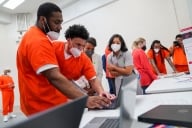You have /5 articles left.
Sign up for a free account or log in.
In the bottom left corner of envelopes that have been arriving at university presidents' offices this week are the words, in bold: "U.S. News and World Report Peer Assessment Survey Participant."
Could this be the annual, controversial survey that presidents fill out on their peer institutions? That survey, crucial to the U.S. News methodology, has been much criticized, but the magazine still relies on it. Those opening the envelope found a survey not from U.S. News but from the company on the return address: AIM, a market research business. The questionnaire wasn't the peer assessment survey.
The apparent aim of the survey may reflect just how much strategizing (some of it expensive) some universities engage in to try to move up a few notches in the rankings.
The questions focus on the motivations a university president would have for giving a particularly high ranking to a peer institution, with possible factors including student selectivity, reputation, stature of faculty, stature of president, federal research dollars, etc. Presidents are also asked where they get their news (both about higher education and generally). They are asked whether they have received promotional materials from colleges seeking to influence their peer assessments. And they are asked which universities use social media effectively.
Then the survey turns to 12 universities -- and asks all university presidents to identify reasons why any of these 12 might not get "distinguished" or at least "strong" rankings. The 12 universities are: Boston College; Carnegie Mellon, Case Western Reserve, Cornell, Emory, Lehigh, New York, Northwestern, and Ohio State Universities; Washington University in St. Louis; and the Universities of Miami and Rochester.
Most of those who have received the survey have speculated that one of those universities paid for the survey, or that a consultant seeking business from one or more of those universities did so. At all 12 of the universities, officials said that they didn't know who sent the survey; some said that they had been able to check with all possible colleagues who could have arranged the project; others said that they were still checking, but that they didn't know about the survey (except for what had arrived in the mail). Officials at several of the universities expressed frustration at their institutions being included.
Robert Morse, who oversees the rankings at U.S. News, was emphatic that the magazine has nothing to do with the survey. "The survey is most definitely not from U.S. News," he said via e-mail. "U.S. News has never conducted such a study. U.S. News believes that a similar study may have been done a few years ago. U.S. News has never seen the results from any such survey. U.S. News has seen a copy of the latest survey that one of the schools sent to us yesterday and since it asks questions about certain schools maybe that means one of them was the sponsor, but we don't know the sponsor."
AIM says it doesn't either -- even though the survey letter opens "Our firm is conducting a study....."
Multiple calls to AIM did not yield anyone willing to discuss the survey in detail. A woman who identified herself as a receptionist said that the company had received a number of calls seeking more information but that the client's identity was confidential. The receptionist said that AIM didn't prepare the survey, but agreed to mail it out and to collect responses.
On a subsequent call, this reporter was transferred to a woman who said she was a project manager at AIM. She would identify herself only as Sally. She said that the receptionist was correct, and that AIM officials didn't even know the contents of the survey. Further, she said that the work was set up through an intermediary, and that AIM doesn't know the client's identity.
One caution for whoever paid for this survey: You might want to check the reliability of the mailing list you purchased. The reason Inside Higher Ed knows about the survey is that this journalist was sent one to fill out, and so was one of his colleagues -- as if we were university presidents who fill out the U.S. News peer assessment.








